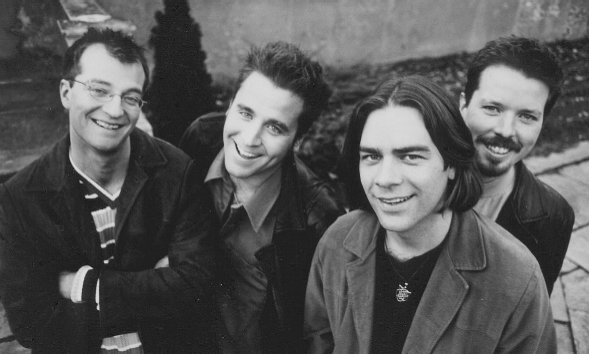| By Brett Milano
You have to look a long way these days to find an unspoiled, regional
music scene; especially one where kids grow up on Celtic folk tunes instead
of Marilyn Manson. You can find that on the Atlantic coast of Canada, where
the old songs are still played in family kitchens, and young garage bands
are as likely to learn "Bog oíLochain" as "Louie Louie."
Two acts from that area hit the hub Thursday: the Newfoundland band
Great Big Sea plays the Paradise, while the Cape Breton chanteuse Mary
Jane Lamond (known as the singer of Ashley MacIsaacís hit "Sleeping Maggie")
hits Johnny Dís. The two acts don't sound remotely alike - the raucous,
acoustic Great Big Sea could be Newfoundlandís answer to the Pogues, while
Lamond favors a haunting, goth-influenced sound. But both recently appeared
on the compilation album "Fire in the Kitchen," put together by folk booster
Paddy Moloney of the Chieftains; and both perform the traditional songs
they grew up with.
Though Lamond now sings only in Gaelic, her background is a bit more
urban. And her fans may be shocked to learn that she once played keyboards
in a Montreal punk band.
"Sure, Iím not in the closet about that - Iíll readily admit that I
love Iggy Pop and the Sex Pistols," she said last week. "Iíve always been
a person who looked to the alternative, and I loved punk music for the
philosophy as well as the sound. That was the first time I cut my hair
short, because I couldnít do the Farrah Fawcett hairdo."
After a spell in the fashion industry, Lamond rediscovered her roots.
"In Cape Breton, music and songs are really the fabric of peopleís lives.
Itís never been a place where people accumulate a lot of possessions; thereís
a lot of pride in the tradition and respect for what people do. Iíll give
you an example: I was in the Outer Hebrides of Scotland recently, and I
heard a traditional song that Iíd also heard in Cape Breton - it was exactly
the same melody, the same verses. So two communities with virtually no
contact had maintained this song for nearly 200 years."
Is there a danger of the music getting too commercialized? "Thereís
already a backlash in Canada, people saying ĎNot another band from Nova
Scotia.í But there are thousands out there with a lot of intrinsic value.
I wouldnít call myself a folkie; Iím more interested in combining traditional
and modern elements."
"Anything that exposes the world to our culture is a good thing," said
Great Big Sea singer Alan Doyle, calling from a pay phone at Kennedy Airport.
"We all grew up with music in our household, and I think Newfoundland
is a place where children and parents do more things together. Everyone
in the small towns has some great talent for parties, whether itís dancing
or playing accordion. When we had house parties, the stereo got turned
off pretty early."
You donít have to be from Newfoundland to recognize one song in Great
Big Seaís repertoire: They turn the R.E.M. hit "Itís the End of the World
as We Know It (and I Feel Fine)" into a sea chantey.
"We wanted to support the struggling American artists, we figured they
could use the money," Doyle said, laughing. "I know it was a protest song
in the Ď80ís but we do it in a different spirit, because the singer is
optimistic in the face of the apocalypse. Thatís a Newfoundland kind of
attitude."
And, of course, people in America might think of Newfoundland as the
end of the world. "Thatís true. But we all know that itís really the center
of the world." |
